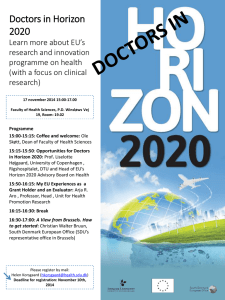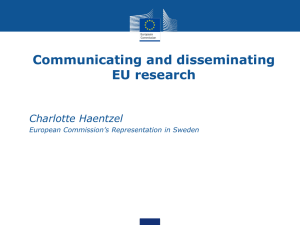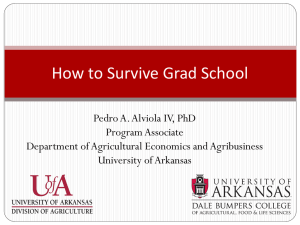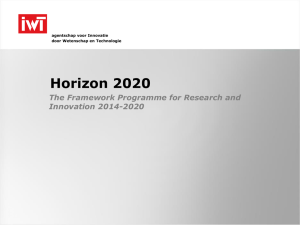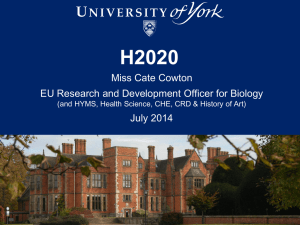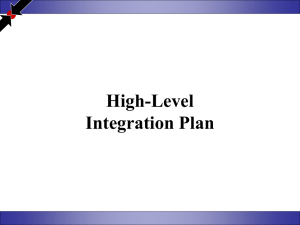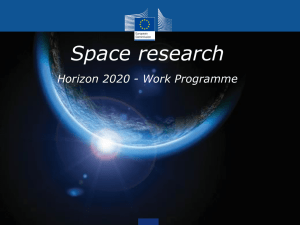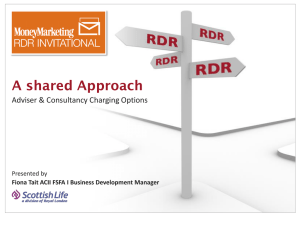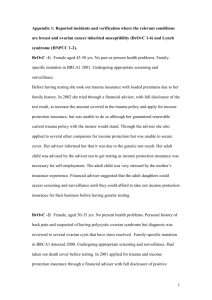Slides from the presentation - Research at Oslo University Hospital
advertisement
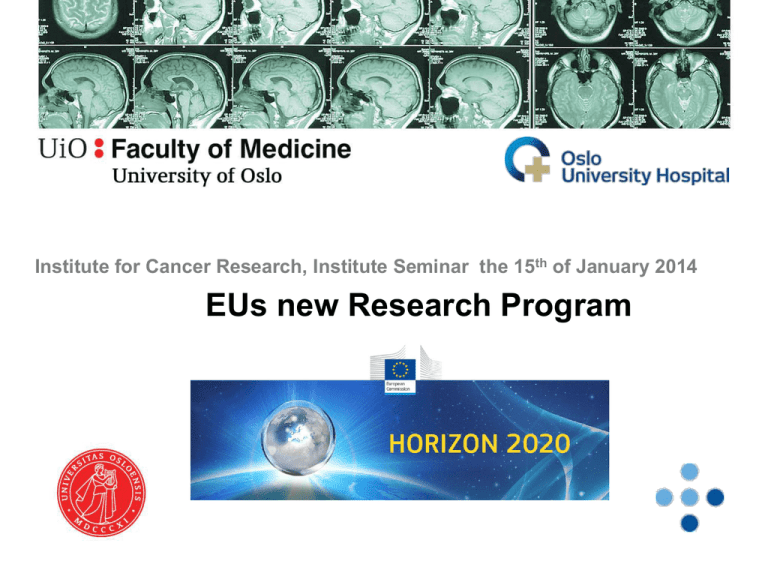
Institute for Cancer Research, Institute Seminar the 15th of January 2014 EUs new Research Program Background Political priorities in the EU European Research Area (ERA) Free movement of knowledge/ “fifth freedom” – internal market for research Europe 2020 Ensure Europe's competitiveness, new jobs and economic growth Innovation Union 1. Become a World class Science Performer 2. Remove barriers to innovation 3. Revolutionize public–private partnership Horizon 2020 Instrument to reach the objectives set out above How will your research project contribute to solving European problems? Horizon 2020 • One program bringing together three previous programmes (FP7, CIP, EIT) • Linking research and innovation closely together • Focus on societal challenges; e.g. health, clean energy and transport • Simplified rules for universities, enterprises and institutes in all EU member states and beyond Horizon 2020 • Two-year work programme – calls for proposals are more general • 100% coverage of direct costs + 25% overhead for all institutions • Reduction of average time from application to contract - approx. 250 days • Strong focus on SMEs Horizon 2020 • First call for proposals out December 11 2013 • Budget 79 billion Euro 2014 – 2020 • Influence and network: The Research Council – National Contact Points Advisory Groups H2020 European Cooperation in Science and Technology (COST) Register as an evaluator European/international project partners Horizon 2020 three pillars Excellent Science ERC Industrial Leadership Leadership in enabling and industrial Technologies FET Marie S. Curie Access to Risk Finance Research Infrastructures Innovation in SMEs Societal Challenges Health, demographic change and wellbeing Secure, clean and efficient energy Climate action, resource efficiency and raw material Food security, sustainable agriculture, marine and maritime research and the bio-economy Smart, green and integrated transport Inclusive, innovative and reflexive societies Secure societies Excellent Science ERC European Research Council (ERC): Starting grants Consolidator Grants Advanced Grants Synergy Grants Proof of Concept (StG) (CoG) (AdG) (SyG) (PoC) 2 - 7 after PhD 7 - 12 after PhD Leading scientists 2 - 4 Principal Investigators (PI) FET Future end emerging technologies (FET): FET Open: fostering novel ideas FET Proactive: nurturing emerging themes and communities FET flagships: tackling grand interdisciplinary science and technology challenges When to apply for ERC ? Starting grant (StG) 2 - 7 after PhD Early achievement track record: NB! At least one important publication without the participation of their PhD supervisor 1. 2. 3. Publications in major international peer-reviewed multi-disciplinary scientific journals Granted patent(s) (if applicable) Invited presentations to peer-reviewed, internationally established conferences and/or international advanced schools (if applicable). Consolidator Grant (CoG) 7 - 12 after PhD Early achievement track record: NB! Several important publications without the participation of their PhD supervisor 1. 2. 3. Publications in major international peer-reviewed multi-disciplinary scientific journals Granted patent(s) (if applicable) Invited presentations to peer-reviewed, internationally established conferences and/or international advanced schools (if applicable). Advanced Grants Leading scientists 10-year track record: 1. 2. 3. 4. Highlight ten representative publications, as senior author Research monographs and any translations thereof (if applicable). Granted patents (if applicable). Invited presentations to peer-reviewed, internationally established conferences and/or international advanced schools (if applicable) 5. Research expeditions that the applicant Principal Investigator has led (if applicable). Excellent Science Marie Curie Marie Curie Actions - Research Fellowship Programme: Initial Training Network (ITN) Individual Fellowships (IF) International Research and Innovation Staff Exchange Scheme (RISE) Co-funding of Regional, National, and International Programmes (COFUND) European Researchers’ Night (NIGHT) When to apply for Marie Curie ? Individual Fellowships (IF) • Bottom-up • Post doc or min. 4 years research experience • Research stay (12-24 months) incoming or outgoing Initial Training Network (ITN) • Bottom-up • Collaboration between institutions in doctoral training (also academia and business) Societal Challenges Health, demographic change and wellbeing Budget 1.08 Bn. € 2014 - 2015 Calls for personalising health and care (PHC): 1. 2. 3. 4. 5. 6. 7. Understanding health, ageing and diseases (3 calls) Effective health promotion, disease prevention, preparedness and screening (6 calls) Improving diagnosis (3 calls) Innovative treatments and technologies (6 calls) Advancing active and healthy ageing (4 calls) Integrated, sustainable, citizens-centred care (7 calls) Improving health information, data exploitation and providing an evidence base for health policies and regulation (5 calls) DEADLINES: Stage 1 - 11/3, Stage 2 - 19/8 When to apply for ”Health, demographic change and wellbeing” ? • • Research field has an European/international dimension Focus on finding solutions together with companies and other institutions Collaborative projects • Minimum 3 independent entities from 3 different member states/associated countries (Norway, Switzerland, Iceland, Israel and others) • Any additional requirements will be announced in the call Who can receive funding • EU member states or associated countries • "Third countries" that have an agreement with the EU on participation (USA) • European organizations • Legal entities mentioned in the work programme • Other legal entities whose participation is essential for the implementation of project Other activities under the Health Programme • Public-public partnerships – EDCTP (European and Developing Clinical Trials Partnerships) – AAL (Active and Assisted Living) • Public-private partnership – IMI (Innovative Medicines Initiative) Horizon 2020 work programme is found here Use keywords for your research and find topics Rules for participation , Work Programme Topics Guide for Applicants Remember…. • ‘Two stages submission’ • Less specific calls – greater freedom to the research community, but greater risk of misinterpretation – check carefully the ‘scope’ og ‘expected impact’ in the call text! • Interdisciplinary and intersectoral approaches • Innovation – more innovative products, solutions and services Important to… • Read the Work Program and topics very carefully • Find a topic that matches your research • Identify relevant partners to your project! Sweden + Denmark • Talk to colleagues with experience on EU applications and projects Its useful to… • Check former EU funded research projects for partners! http://www.healthcompetence.eu/converis/publi cweb/area/1353 • Find out what have been funded in your field of research in FP6 and FP7 http://ec.europa.eu/research/health/events_en. html • Register as an expert – evaluation of proposals EU application – what need to be done? Part B Part A Administrative information Attachments ? Scientific proposal /technical annex How to write successful proposals ? 1. Sell your idea/project proposal! - why bother? (what problem are you solving?) is it an European priority? or will this establish Europe as a international leader? is the solution/knowledge already available? why now? why you? 2. Risk evaluation 3. Be aware of your strengths and weakness’ 4. Make a project plan: - what will be done? how long time will it take? and when will it be done? who will do the work? Project plan = Work plan – Time schedule – Resources What is being done? Work plan How long time will it take? and when would it be done? Who is going to do the work? Time schedule Resources Project Plan = Gantt chart Work package (WP) Q1 Year 1 Q2 Q3 Q4 Q1 WP1 ….. Task 1.1 …. Task 1.2 ….. Task. 1.3 …… Task. 1.4 ….. Milestone 1.1 …. Milestone 1.2 ….. WP2 …. Task 2.1 …… Task 2.2 ….. Task 2.3 …… Milestone 2.1 ….. WP3 …… Task 3.1 ….. Task 3.2 ….. Task 3.3 ….. Task 3.4 ….. Milestone 3.1 …. Milestone 3.2 …. WP4 Task 4.1 …. Task 4.2 …. Milestone 4.1 …. Milestone 4.2 …. * Resources: Senior scientist (S), postdoc (P), PhD (D), technician (T) Year 2 Q2 Q3 Q4 Q1 Year 3 Q2 Q3 Q4 Resources* T, D T, D T, D, S T, D, P D, P T, P D, P, S T, D D T, P T, D, P P, S D, P How is EU projects funded? Budget – remember to include! • Salary and social security costs • Travel costs • Salary increase • Publishing costs • Consumables • Audit • Equipment • In-kind contributions Support services for EU Applications and Projects Pre - grant • Information about programs and calls • Help with the application (administrative data and coordination, read through applications) • • Budget Project establishment support (PES) Post - grant: • Negotiations • Rules • Grant Agreements and Consortium Agreements • Contract amendments • Financial reports and Audits Project establishment support (PES) • Costs related to partner search and establishment of the consortium • Travel costs • Personnel costs – project planning and proposal writing • Consultant costs UiO PES OUS PES Contact information University of Oslo Name & posistion E-mail EU- office Ann Kristin Sørli Halvorsen, adviser Mette Topnes, senior adviser Deike I. Pahl, senior adviser Lars Øen, senior adviser Marianne Randen, senior legal adviser euoffice@admin.uio.no Faculty of medicine Konstantinos Chilidis, senior adviser Erlendur Helgason, senior adviser Malin Solli Johansen, adviser Marta Lorens-Thommesen, adviser Institutt for klinisk medisin Reidar Rognlien, Head of section Oslo University Hospital Name & posistion E-mail Research Support Unit Peder Utne, head of department Emil Aanensen, special adviser Trine-Lise Key Grimsrud, special adviser Camilla Lien Sandnes, senior adviser Martin Sending, special adviser grants@ous-hf.no

